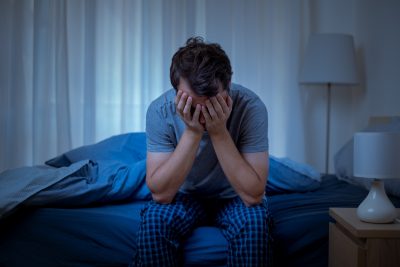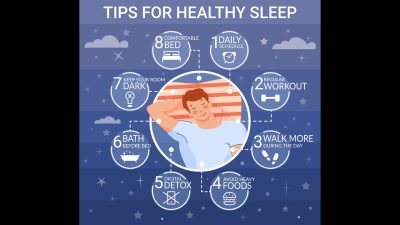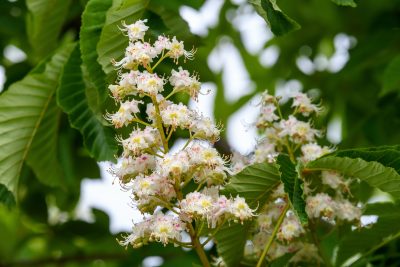Lukas Waldmann, Swiss Certified Naturopath TEN, Rotkreuz, Switzerland
Heike Lorenz, Bachfoundation Registerd Practitioner (BRP), Leupoldsgrün, Germany
40% of the Swiss are suffering from sleeping disorders (worldwide 30-40% of the population). Nevertheless, a good night’s sleep is essential for our own health. Over the last two generations, we have lost an average of 1.5 hours of sleep per day worldwide. Naturopath Lukas Waldmann explained that there are five phases of sleep: the falling asleep phase (1), the light sleep phase (2), the deep sleep phase (3), the deep sleep (4) and the REM sleep (5). In the last phase, we dream, process our experiences and store the information in our long-term memory. The body’s sleep-wake rhythm is controlled by hormones such as melatonin, adenosine and cortisol, which are produced or broken down during the day. However, these can be negatively influenced by external factors. Did you know that not watching TV or sitting in front of the computer one hour before bedtime promotes sleep? This is because the artificial blue light from screens affects the function of the pineal gland, which in turn is responsible for melatonin production in the body. But alcohol, coffee and sugar or a late and too rich dinner can also have a detrimental effect.

For positive support of sleep by lowering the stress hormone cortisol, Lukas Waldmann recommended drinking plenty of water, vitamin C, Rhodiola rosea (rose root), magnesium or even some dark chocolate. To support melatonin production, taking Griffonia simplicifolia with the ingredient 5-HTP (5-hydroxytryptophan) can be useful. In addition, teas or tinctures from medicinal plants such as taiga root, rose root, passion flower, hops, lavender, St. John’s wort, butterbur, gingko and turmeric can promote falling asleep and sleep. The speaker also demonstrated some practical exercises to strengthen the parasympathetic nervous system (the rest or recovery nerve), such as ear massage, tapping on the zygomatic bone or sternum, and the 4-7-8 breathing technique.
It should also not be forgotten that the increasing exposure to technical electromagnetic fields, especially radiation from the ubiquitous mobile communication devices, puts our nervous system under constant stress, making it increasingly difficult for us to “wind down”. However, the most important thing for a good night’s sleep is rhythm. It is advisable to always get up and go to sleep at the same time – ideally in rhythm with the Sun. This is because an important function of sleep is the synchronisation of our organism with the universe and the Sun, whose natural light provides the primary impulse for our day-night rhythm. If we live rhythmically, our organs can also arrange themselves according to the organ clock with their function in this rhythm and in turn support our synchronisation, which is as exact as possible.

In her presentation, the trained Bach flower therapist Heike Lorenz explained the gentle healing method according to Dr. Edward Bach and motivated the audience of her lecture to use the 38 Bach flowers in daily life to bring one’s own emotions back into balance.

For the founder Dr Edward Bach, the true cause of illness lay in negative feelings such as fear, insecurity, loneliness, despair, etc. For a healthy life, which according to Dr Bach is “the birthright of every human being”, it is necessary to recognise and transform these feelings. For him, health was “the complete unity between soul, mind and body. And this unity is not an unattainable goal, but one so simple and natural that many of us have simply overlooked it”. The 38 flower essences are meant to help to get out of negative emotional states and to transform them, as Dr Bach said, “back into positive, joyful, hopeful and happy feelings”.
You have probably also experienced that you could not fall asleep because you had a kind of “thought carousel” in your head. The next time this happens, you could take the Bach flower “White Chestnut” to help you calm down again and think clearly. Or does your child have nightmares and can only fall asleep with the light on, for example? Then the Bach flower “Aspen” (trembling poplar) could help so that your child can let go of its unfounded fears. For emergencies, when you or your loved ones have received bad news or you feel a sense of panic, the yellow sunflower “Rock Rose” can help. The speaker described many other situations in which Bach flowers can be a great and uncomplicated support in everyday life.

Heike Lorenz has seen in practice how effectively the Bach flowers work with animals, children and adults (sometimes immediately afterwards or sometimes after taking them for several weeks). Her enthusiasm for the 38 flowers of grasses, trees, shrubs, which represent so-called “Psychotherapy from Mother Earth”, was clearly felt.
22nd October 2022, Hotel Mövenpick, Regensdorf









